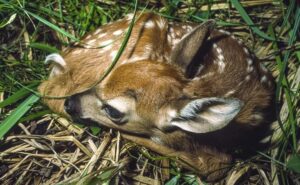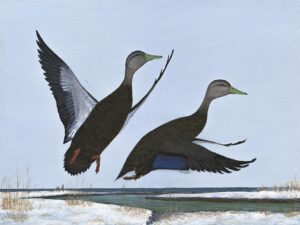Massachusetts DFW (MassWildlife) is reminding us that young wildlife belong in the wild and urging us to leave them alone. Finding a young animal alone does not mean it’s been abandoned or needs to be rescued. Adults are often nearby and visit their young only occasionally to avoid detection from predators.
What you should do:
- If you find a baby bird: While baby birds may look helpless, they do not need your assistance unless you see clear signs of injury, like a broken wing. If you find a hatchling or nestling (a young bird without feathers) outside the nest, you can try to return it to its nest or create an artificial nest. The parents will not reject it if you touch it. If you find a fledgling (a young, fully feathered bird) outside the nest, leave it alone. While it is spending some time hopping around on the ground learning how to fly, the parents are usually nearby still taking care of it. If you find a fledgling near a road or exposed to danger, it can be moved to a safer, sheltered location nearby. Young birds naturally have a low survival rate, which keeps populations in balance with available resources.
- If you find a fawn: Young deer are born in late May and early June. Even if you see a fawn alone for several days, you should still leave it alone. The animal may be motionless and seem vulnerable, but this is the normal behavior for a fawn and the mother (doe) is probably feeding or bedded nearby. Fawns are safest when left alone because their camouflaging color helps them remain undetected. Does visit their fawns to nurse very infrequently, a behavior that helps fawns avoid detection by predators. If sympathetic people repeatedly visit a fawn, it can prolong separation from the doe and delay needed feeding. Fawns cannot be cared for by wildlife rehabilitators; if a fawn is visibly injured or found with its dead mother, call MassWildlife at (508) 389-6300.
- If you find bunnies or other young mammals: Generally, young mammals are visited by their mother only a few times a day to avoid attracting predators to the young. For example, a nest of bunnies will only be visited by the adult female twice per day to nurse the young. The young are generally safe when left alone because their color patterns and lack of scent help them remain undetected. In most cases, it’s best to leave young animals alone.
- Keep pets leashed. Keeping pets indoors or restrained helps wildlife, as pets often like to chase and hunt songbirds and other mammals. This also helps your pets avoid health and safety dangers posed by wild animals, other pets, or automobiles.
- Contact a wildlife rehabilitator for advice. In almost all cases, it’s best to leave wildlife alone and let nature take its course. In the rare case you find a young animal with a dead parent or if you see visible signs of injury, you can contact a licensed wildlife rehabilitator for assistance. An injured wild animal may be assisted, but a person must deliver the animal immediately to a licensed rehabilitator. MassWildlife licenses wildlife rehabilitators who are qualified to care for most injured or truly orphaned wildlife.
For more information on what to do if you find sick, injured, or young wildlife, click onto https://www.mass.gov/info.
Trout stocking
Last week, subject to last minute change, the following local waters were scheduled to be stocked by Massachusetts DFW: Green River (South) in Alford, Egremont and Great Barrington; West Branch of the Westfield River in Becket, Chester, Huntington and Middlefield; Westfield River East Branch in Cummington (C&R), Chesterfield (C&R) and Huntington; Westfield River Middle Branch in Middlefield, Chester, Huntington and Worthington; Westfield Mainstem in Huntington, Russell, Montgomery; Cold River in Florida and Charlemont, Hoosic River (North Branch) in Clarksburg and North Adams, Hudson Brook in Clarksburg and North Adams, Farmington River in Otis, Tolland and Sandisfield; Green River (South) in Alford, Egremont and Great Barrington; Housatonic River (C&R) in Lee and Stockbridge, Konkapot River in Monterey, Ashfield Pond in Ashfield, Littleville Reservoir in Chester and Huntington, Mansfield Pond in Great Barrington and Windsor Pond in Windsor.
New Migratory Game Bird Regulations
A public hearing will be held on Friday, April 23 at 9:30 a.m. to establish rules and regulations relative to the 2021–2022 migratory game bird hunting seasons. This public hearing will be held virtually via Zoom
Due to the migratory game bird season filing requirements of the U.S. Fish and Wildlife Service, the MA Fisheries and Wildlife Board must vote to finalize and approve the 2021–2022 migratory bird seasons at the close of the hearing. Therefore, please note: There will be no written comment period after this public hearing. Written comments may be submitted prior to the hearing via email to susan.sacco@mass.gov, Subject: Fisheries and Wildlife Board, or by postal mail. to the Fisheries and Wildlife Board, MassWildlife Field Headquarters, 1 Rabbit Hill Road, Westborough, MA 01581.
The full proposed rules and regulations are posted on the website https://www.mass.gov/doc/dfw-final-draft-2021-2022-migratory-game-bird-hunting-regulations/download. Interested persons can review them and provide written comments prior to the hearing and oral comments during the public-comment portion of the hearing. Here is a summary of the proposed changes:
- Woodcock Season: October 7 through November 27
- Youth and Veteran’s Waterfowl Hunts: September 25 and October 9
- Early Goose Season: September 7 through September 24
- Regular Goose Season
- Berkshire Zone: October 12 through November 13
- Central Zone: October 11 through November 27 and December 13 through January 1
- Coastal Zone: October 16 through October 23 and November 23 through January 22
- Duck Season
- Berkshire Zone: October 12 through November 27 and December 6 through December 27
- Central Zone: same as Regular Goose Season
- Coastal Zone: same as Regular Goose Season
Youth Artist from Hanson Wins Junior Duck Stamp Contest
Caleb Clemons, a homeschool student from Hanson, won Best of Show in the 2021 Massachusetts Junior Duck Stamp (JDS) Contest. His acrylic painting of American black ducks was selected from 134 entries. Clemons award-winning work will move on to the National JDS Contest. 
Students from kindergarten through grade 12 from across the Commonwealth submitted original works of art depicting waterfowl in appropriate wetland habitat, demonstrating both artistic talent and a knowledge of the value of wetlands for wildlife. In March, MassWildlife held the judging, at which time the top winning artists were selected. Combinations of the top artworks will be exhibited throughout Massachusetts in the coming year based on reopening guidelines for host sites.
The Massachusetts JDS Program is sponsored by MassWildlife and the U.S. Fish and Wildlife Service, with support from the Massachusetts Sportsmen’s Council. You are asked to support the JDS Program and wetland conservation by purchasing Junior Duck Stamps featuring national winners from previous years. Stamps can be purchased at https: // www.duckstamp.com.
To learn more about the Massachusetts JDS Program, and to access the traveling exhibit schedule, visit mass.gov/dfw/jds.
Beagle Club Field Trials
After all that we have been through lately, it will be nice to get out among fellow beagle owners and their dogs. Next weekend, April 24 – 25, the Berkshire Beagle Club on Sleepy Hollow Road in Richmond, MA is having its spring field trials. Some of the best beagles in the northeast will compete at following the scents of snowshoe hares and/or cottontail bunnies. All of the dogs are AKC registered and many already possess championship ribbons won at other field trials. When they strike a scent, they sure sing, some practically yodeling. For beagle lovers, it is truly music to their ears.
The club welcomes folks to come and just listen to the dogs and observe the judges. Every now and then, you will hear someone shout “Tally Ho!” to let the judges know that they spotted a bunny or dog on its scent.
There will be food to purchase there as well as a raffle for an Alpha Tracking System dog collar worth about $300. (Ticket cost $10 or three for $20.) If you decide to attend, remember to bring your mask and practice social distancing.
